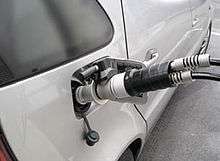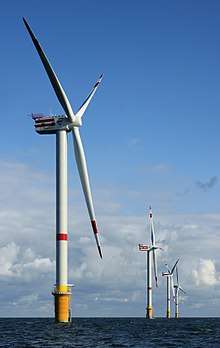Hydrogen technologies
Hydrogen technologies are technologies that relate to the production and use of hydrogen. Hydrogen technologies are applicable for many uses.
Some hydrogen technologies are carbon neutral and could have a role in preventing climate change and a possible future hydrogen economy. Hydrogen is a chemical widely used in various applications including ammonia production, oil refining and energy.[1] Hydrogen is not a primary energy source, because it is not naturally occurring as a fuel. It is, however, widely regarded as an ideal energy storage medium, due to the ease with which electric power can convert water into its hydrogen and oxygen components through electrolysis and can be converted back to electrical power using a fuel cell. There are a wide number of different types of fuel and electrolysis cells.[2]
The potential environmental impact depends primarily on the methods used to generate the hydrogen fuel.
Fuel cells
- Alkaline fuel cell (AFC)
- Direct borohydride fuel cell (DBFC)
- Direct carbon fuel cell (DCFC)
- Direct ethanol fuel cell (DEFC)
- Direct methanol fuel cell (DMFC)
- Electro-galvanic fuel cell (EGFC)
- Flow battery (RFC)
- Formic acid fuel cell (FAFC)
- Metal hydride fuel cell (MHFC)
- Microbial fuel cell (MFC)
- Molten carbonate fuel cell (MCFC)
- Phosphoric acid fuel cell (PAFC)
- Photoelectrochemical cell (PEC)
- Proton exchange membrane fuel cell (PEMFC)
- Protonic ceramic fuel cell (PCFC)
- Regenerative fuel cell (RFC)
- Solid oxide fuel cell (SOFC)
Hydrogen infrastructure
- Hydrogen pipeline transport
- Hydrogen pressure letdown station
- Compressed hydrogen tube trailer
- Liquid hydrogen tank truck
- Hydrogen piping
- Hydrogen station
- HCNG
- Homefueler
- Home Energy Station
- Hydrogen highway
- Zero Regio
- Hydrogen compressor
- Electrochemical hydrogen compressor
- Guided rotor compressor
- Hydride compressor
- Ionic liquid piston compressor
- Linear compressor
- Hydrogen turboexpander-generator
- Hydrogen leak testing
- Hydrogen sensor
- Hydrogen purifier
- Hydrogen analyzer
- Hydrogen valve
Hydrogen storage
Hydrogen vehicles
Historic hydrogen filled airships
Hydrogen powered cars

Audi:
- 2004 – Audi A2H2-hybrid vehicle
- 2009 – Audi Q5-FCEV[3]
BMW:
- 2002 – BMW 750hl
- 2010 – BMW 1 Series Fuel-cell hybrid electric[4]
Chrysler:
- 2000 – Jeep Commander II-hybrid vehicle-Commercial
- 2001 – Chrysler Natrium-hybrid vehicle
- 2003 – Jeep Treo-Fuel cell
Daimler:
- 1994 – Mercedes-Benz NECAR 1
- 1996 – Mercedes-Benz NECAR 2
- 1997 – Mercedes-Benz NECAR 3
- 1999 – Mercedes-Benz NECAR 4
- 2000 – Mercedes-Benz NECAR 5
- 2002 – Mercedes-Benz F-Cell based on the Mercedes-Benz A-Class
- 2005 – Mercedes-Benz F600 Hygenius
- 2009 – Mercedes-Benz F-CELL Roadster
- 2009 – Mercedes-Benz F-Cell based on the Mercedes-Benz B-Class[5]
Fiat:
- 2001 – Fiat Seicento Elettra H2 Fuel Cell-hybrid vehicle
- 2003 – Fiat Seicento Hydrogen-hybrid vehicle
- 2005 – Fiat Panda Hydrogen-Fuel cell
- 2008 – Fiat Phyllis-Fuel cell
- 2008 – Fiat Panda-Fiat Panda HyTRAN[6]
Ford:
- 2000 – Ford Focus FCV-Fuel cell. Note however that Ford Motor Company has dropped its plans to develop hydrogen cars, stating that "The next major step in Ford’s plan is to increase over time the volume of electrified vehicles".[7]
- 2006 – F-250 Super Chief a Tri-Flex engine concept pickup.
Forze Hydrogen-Electric Racing Team Delft
General Motors:
- 1966 – GM Electrovan-Fuel cell
- 2001 – HydroGen3-Fuel cell
- 2002 – GM HyWire-Fuel cell
- 2005 – GM Sequel-hybrid vehicle
- 2006 – Chevrolet Equinox Fuel Cell[8]
- 2007 – HydroGen4
Honda:
- 2002 – Honda FCX – hybrid vehicle
- 2007 – Honda FCX Clarity – Hydrogen Fuel cell – Production model
Hyundai:
- 2001 – Hyundai Santa Fe FCEV
- 2010 – Hyundai ix35 FCEV[9]
Lotus Engineering:
Kia:
- 2009 – Kia Borrego FCEV-Fuel cell[11]
Mazda:
- 1991 – Mazda HR-X Hydrogen Wankel Rotary.
- 1993 – Mazda HR-X2 Hydrogen Wankel Rotary.
- 1993 – Mazda MX-5 Miata Hydrogen Wankel Rotary.
- 1995 – Mazda Capella Cargo, first public street test of the hydrogen Wankel Rotary engine.
- 1997 – Mazda Demio FC-EV Methanol-Reducing Fuel Cell
- 2001 – Mazda Premacy FC-EV – First public street test of the Methanol-Reducing Fuel Cell vehicle in Japan
- 2003 – Mazda RX-8 Hydrogen RE Hydrogen \ Gasoline hybrid Wankel Rotary.
- 2007 – Mazda Premacy Hydrogen RE Hybrid
- 2009 – Mazda 5 Hydrogen RE Hybrid[12]
Mitsubishi:
- 2004 – Mitsubishi FCV
Morgan:
- 2005 – Morgan LIFEcar-hybrid vehicle-concept car
Nissan:
- 2002 – Nissan X-Trail FCHV-hybrid vehicle. Note, however that in 2009, Nissan announced that it is cancelling its hydrogen car R&D efforts.[13]
Peugeot:
- 2004 – Peugeot Quark
- 2006 – Peugeot 207 Epure
- 2008 – H2Origin-Fuel cell
Renault:
- Scenic ZEV H2 is a hydro-electric MPV co-developed by Nissan.
Riversimple:
- 2009 – Riversimple Urban Car
Ronn Motor Company:
- 2008 – Ronn Motor Scorpion
Toyota:
- 2002 – Toyota FCHV-hybrid vehicle
- 2003 – Toyota Fine-S-concept car
- 2003 – Toyota Fine-N-concept car
- 2005 – Toyota Fine-T-concept car
- 2005 – Toyota Fine-X-concept car
- 2008 – Toyota FCHV-adv-preproduction vehicle (expected public release 2015) [14]
Volkswagen:
- 2000 – VW Bora Hy-motion-Fuel cell
- 2002 – VW Bora Hy-power-Fuel cell
- 2004 – VW Touran Hy-motion-Fuel cell
- 2007 – VW space up! blue
Hydrogen powered planes
- Hyfish
- Smartfish
- Tupolev Tu-155-hydrogen-powered version of Tu-154[15]
- Antares DLR-H2 -The first aircraft capable of performing a complete flight on fuel-cell power only
Possible future aircraft using precooled jet engines include Reaction Engines Skylon and the Reaction Engines A2.
Hydrogen powered rockets
The following rockets were/are partially or completely propelled by hydrogen fuel:
Related technologies
Environmental
Nuclear
Organic chemistry
Miscellaneous
- Hydrogen odorant
- Atomic hydrogen welding
- Hydrogen-cooled turbogenerator
- Oxyhydrogen flame
- Low hydrogen annealing
- Hydrogen decrepitation process (HD)
- Hydrogenation disproportionation desorption and recombination (HDDR)
- Standard hydrogen electrode
- Reversible hydrogen electrode
- Dynamic hydrogen electrode
- Palladium-Hydrogen electrode
- Cathodic protection
- Iron-hydrogen resistor
- Hydrogen pinch
- Hofmann voltameter
- Hydrox
- Hydreliox
- Joule-Thomson effect
- Hydrogen ion
- Bussard ramjet
- Döbereiner's lamp
- Nickel hydrogen battery
- Gas-absorption refrigerator
- Electroosmotic pump
- Sodium silicide
- Temperature-programmed reduction
- Hydrogen damage
- Hydrogen embrittlement
See also
| Wikimedia Commons has media related to Hydrogen technologies. |
References
- ↑ Badwal, Sukhvinder P.S.; Giddey, Sarbjit; Munnings, Christopher. "Hydrogen production via solid electrolytic routes". Wiley Interdisciplinary Reviews: Energy and Environment. 2 (5): 473–487. doi:10.1002/wene.50.
- ↑ Badwal, SPS (2014). "Emerging electrochemical energy conversion and storage technologies". Frontiers in Chemistry. 2: 79. doi:10.3389/fchem.2014.00079. PMC 4174133. PMID 25309898.
- ↑ netinform: Hydrogen and Fuel Cells
- ↑ netinform: Hydrogen and Fuel Cells
- ↑ netinform: Hydrogen and Fuel Cells
- ↑ netinform: Hydrogen and Fuel Cells
- ↑ "Ford Motor Company Business Plan", December 2, 2008
- ↑ netinform: Hydrogen and Fuel Cells
- ↑ netinform: Hydrogen and Fuel Cells
- ↑ netinform: Hydrogen and Fuel Cells
- ↑ First Drive: hydrogen-powered Kia Borrego FCEV and Nissan X-Trail FCV
- ↑ netinform: Hydrogen and Fuel Cells
- ↑ Dennis, Lyle. "Nissan Swears Off Hydrogen and Will Only Build Electric Cars", All Cars Electric, February 26, 2009
- ↑ netinform: Hydrogen and Fuel Cells
- ↑ Hydrogen Powered Tupolev Tu-155 Archived 2010-11-26 at the Wayback Machine. Development of Cryogenic Fuel Aircraft, Tupelov
